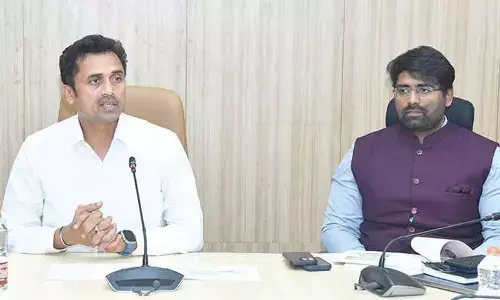'Online learning shapes future generations'

E-Learning was previously considered an alternative for students, particularly those unable to attend their authorised schools, the pandemic basically necessitated eLearning as a practical and safe way of continuing education during lockdown or quarantine.
Bengaluru: E-Learning was previously considered an alternative for students, particularly those unable to attend their authorised schools, the pandemic basically necessitated eLearning as a practical and safe way of continuing education during lockdown or quarantine. Several urban areas quickly adopt such techniques, many students may find it difficult to transition to eLearning owing to two key factors- lack of network and school teachers who are unable to deal with the rapid shift in technology.
Even before the coronavirus pandemic, the eLearning industry had been rapidly developing. Although students possess required skills, many of them face problems related to placement support. "Students not only gain skills but also get placed. Through the new age technology training, and making the students IT career-ready, the students procure relatively high-paying jobs at leading IT companies than what were offered to them before," says Sricharan Tadepalli, COO and Co-founder of byteXL.
"Employers no longer have to spend huge amount upto $20,000 on training the freshers and can expect lower attrition rates. Students are prepared in a way that they can handle industry-level challenges from Day 1 of employment. Also, unlike other EdTech platforms, byteXL's B-2-B model lessens the financial burden on students and helps them focus on their training," he adds.
It isn't just about tier 1 cities as they can manage learning quickly. "The Hybrid training model caters to students across cities preparing them and making them IT Career ready. Even catering to Tier 3 Colleges in mostly rural areas with no or little internet connectivity," he says.
Teaching has certainly adopted technology but it cannot replace instructor-based teaching. "In a way it would complement the instructor-based teaching. Technology has empowered students to self-learn, but it is not the way to go in the long run as it will be devoid of student-teacher interaction and developing analytical abilities. Hybrid learning is going to be future complemented by the upcoming technologies including AI, VR and others," he explains.
"We are aiming at expansion plans i.e. reaching 150 colleges with 240,000 students from the current 70 institutes covering 72,000 students. At this time, we have a dominant presence in Telangana, Andhra and rapidly expanding in Maharashtra. We have also signed up institutes in Punjab and Rajasthan as well and are currently expanding into other states," he says.
It is vital for both the academicians and the corporates to train the students in such a way that they become self-reliant. "The future can be promising as long as both the academia and corporates get students trained in a way that reduced attrition rates, lowers the need of on-the job training, makes students self-reliant - and all this by making EdTech affordable. There is no dearth of talent in India but we just need to play a role in cultivating it in the right direction," he concludes.









